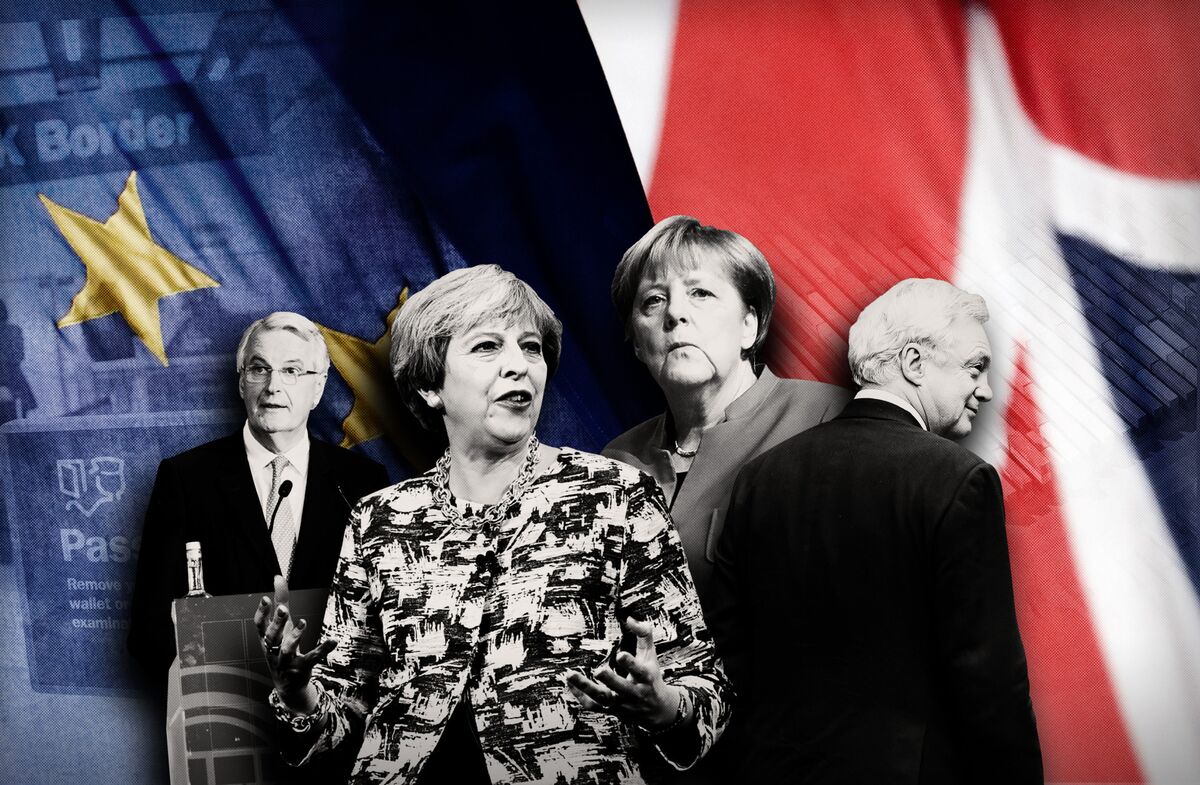
Sign up to receive the Brexit Bulletin in your inbox, and follow @Brexit on Twitter.
Brexit Secretary David Davis offered lawmakers Monday what at first looked like a concession: they would get a vote on the final exit deal. But it soon became clear their ballots would carry little weight: Parliament only gets the take-it-or-leave-it choice of accepting the deal he has negotiated or tumbling out of the bloc without one.
Lawmakers were soon competing to provide the most colorful metaphor for having a gun to their heads.
“What we are faced with is a choice of putting a gun to our own head and blowing it off,” said Labour`s Mike Gapes.
Further restricting lawmakers’ leeway during the final stages of Brexit, the government wants to write into law the date that Britain will leave. Designed as a concession to the pro-Brexit camp in the divided ruling Conservative Party, the proposal means there’s no way Britain could ask for an extension if talks fail. Davis said prolongation would be unlikely anyway as an extended date would need to be unanimously approved on the EU side.
The debate was a prelude to what starts in earnest Tuesday. The government’s landmark piece of Brexit legislation, the EU Withdrawal Bill, goes to Parliament for detailed, line-by-line scrutiny. Lawmakers have proposed about 300 amendments, and the first step will be for the speaker to select which ones get debated. With Parliament divided along Brexit lines, a cross-party rebellion underway and Prime Minister Theresa May having only a slim majority with the support of Northern Ireland’s Democratic Unionist Party, the government risks defeat on any of the votes.
That’s why it has has been trying to make concessions, like the one on the final vote.
Brexit’s Critical Five Weeks: The Key Dates as the Clock Ticks
Dominic Grieve, a former attorney general and Cabinet colleague of May’s, is leading cross-party efforts to amend the bill in a way that would smooth the exit process and leave more options open for the final stages of talks. The pro-Brexit camp sees in those amendments an attempt to reverse Brexit. In any case it’s going to be a late night, with the debate expected to run for hours.
Brexit Latest
50-50 | Before appearing in Parliament, Davis joined May to meet European business leaders in Downing Street. According to two accounts, he said the chances of getting a breakthrough in talks by the December summit were 50-50. “I asked Davis whether he still thought a deal was possible” by the European Union’s December summit, Emma Marcegaglia, head of the BusinessEurope lobby group, said in an interview. “He said there was a 50-50 chance.” Davis’s office denies he made the comments.
Market Optimism | A Bloomberg survey of seven banks puts the chances a bit higher, at 68 percent, Charlotte Ryan reports. The most bullish sterling forecast is from Nomura International Plc, which sees the pound rising 7 percent to $1.40 by year-end on the back of a deal, while Commerzbank AG’s call for the currency to weaken as much as 10 percent in the absence of an agreement is the most bearish.
Russian Meddling | May told Russian President Vladimir Putin that Britain was ready to fight back against attempts to destabilize Western democracy that she said included “meddling in elections.” “We know what you are doing,” May said in a section of a foreign policy speech that she addressed to Russia late Monday at a formal dinner hosted by the Lord Mayor of London. Britain’s elections regulator is investigating whether Russia tried to use social media to influence the Brexit campaign.
Guns or Growth | Will a border dividing Ireland bring back violence? Probably not, according to Bloomberg’s Rodney Edwards. Former Irish Republican Army hunger striker Tommy McKearney, 65, says economic damage is the thing to worry about. “There is little or no appetite for a return to violent conflict and the support necessary to maintain a campaign does not exist,” he says. “Most republicans that I speak with tend to see Brexit as an economic issue rather than a democratic matter.”
And Finally…
EU chief negotiator Michel Barnier’s comments that a no-deal Brexit would endanger Brits’ ability to take their pets on holiday has struck a nerve. British newspapers picked up the remarks and shouted back at him, with the Telegraph accusing Barnier of trying to “bully the Brits via our pets,” and saying he had “unleashed the hounds of hell on himself.” The BBC was forced to publish an explainer.
For more on Brexit follow Bloomberg on Twitter, Facebook and Instagram.


0 comments:
Post a Comment